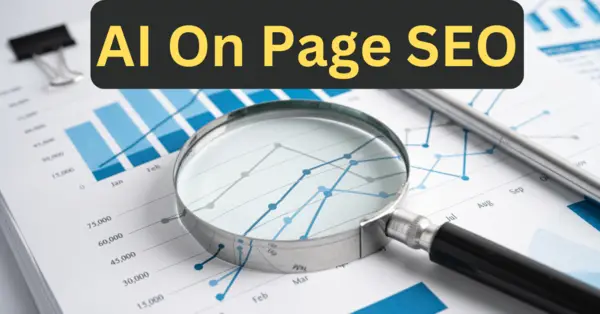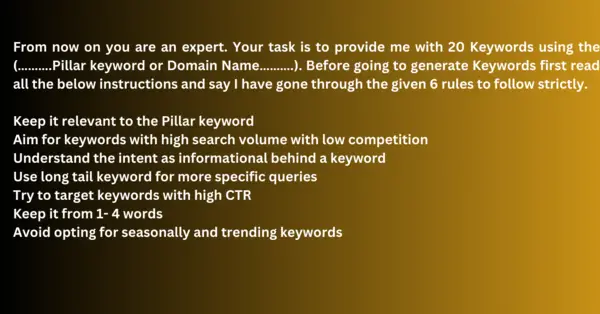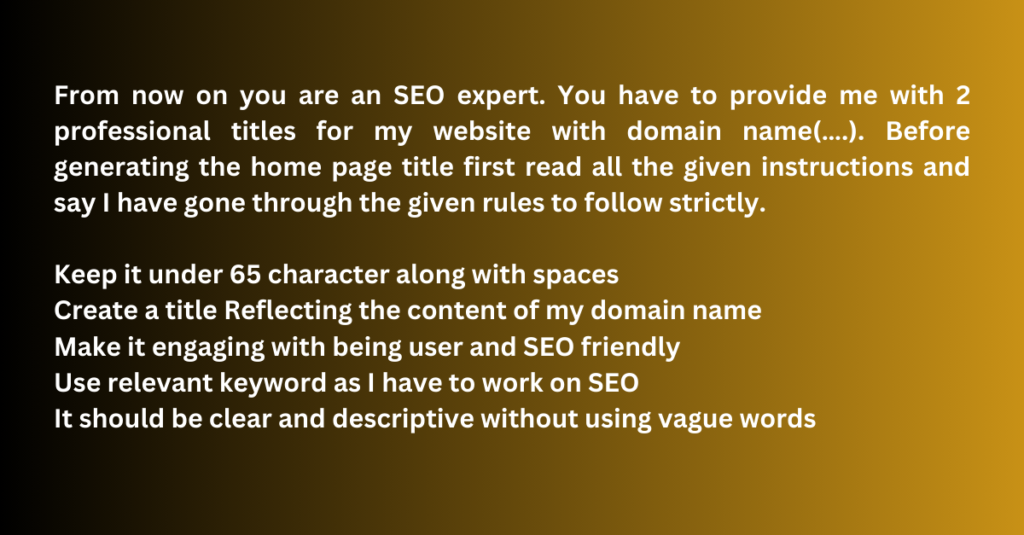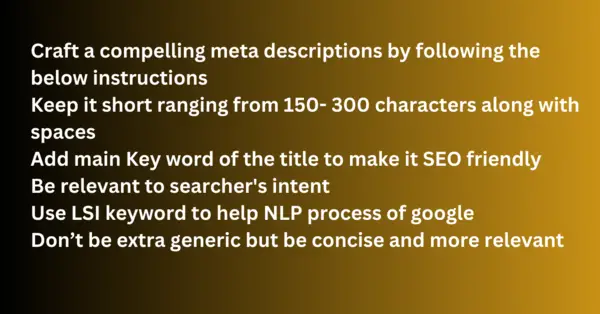
Decoding AI On-Page SEO : The Ultimate Mastering Guide
AI Onpage SEO refers to the involvement of artificial intelligence to anything that has been done on a page for improving a website’s performance in search engine result pages (SERPs). It’s the art of fine-tuning content, HTML source code, and structural elements on a page to ensure that search engines comprehend and prioritize it in the content pool.
Although when it comes to AI helping in on-page SEO most of the people consider it impractical. But Here you will get a complete on site strategy so you can get valuable results using this strategy.
Understanding On Page SEO Components
On-page SEO involves several critical components that collectively contribute to optimising a web page for search engines. No doubt the key elements are too many but the prior one is Content Quality and Relevancy. As we know that it performs the duty of a king in all the remaining factors.
Others include Keyword Optimization, Proper Tags, Meta Descriptions, Headers (H1, H2, etc.), and URL Structure. Along with this Internal Linking and Image Optimization are also included. Now Let’s break down the details of the role of AI in each sector.
What is AI and How It Works
AI, or Artificial Intelligence, represents a branch of computer science focused on creating machines that mimic human cognitive functions. It encompasses various technologies like machine learning, deep learning, natural language processing, and computer vision. Machine learning enables machines to learn from data, improving their performance without explicit programming, while deep learning uses neural networks to process information in layers, recognizing patterns and making decisions.
Natural Language Processing allows machines to understand and generate human language, while computer vision enables them to interpret visual data. AI systems learn and evolve by analyzing vast amounts of data, identifying patterns, and adjusting algorithms based on feedback, aiming to perform tasks that typically require human intelligence.
How AI Helps In On Page SEO Process
AI’s integration into On-Page SEO revolutionizes content optimization and user experience. Through advanced algorithms, AI tools analyze vast datasets, identifying patterns in user behavior and search intent. This deep understanding enables precise keyword recommendations and the creation of tailored, high-quality content that resonates with users’ needs.
Moreover, AI augments On-Page SEO by streamlining structured data implementation, improving readability through natural language processing, and catering to the rise of voice search. By staying ahead of technological advancements and user preferences, AI-equipped strategies empower websites to remain competitive, relevant, and engaging in the ever-evolving digital landscape.
AI On Page SEO: 7 Ways to Improve Your Website
The integration of Artificial Intelligence (AI) into On-Page SEO unveils a transformative path towards optimizing website performance. Through the implementation of AI-driven strategies such as smart keyword optimization, content personalization, and structured data utilization, websites can significantly enhance their search visibility and user engagement.
AI’s predictive capabilities, coupled with its capacity to refine user experience and adapt content for emerging trends like voice search, stand as pivotal tools for staying ahead in the competitive digital sphere. By embracing AI technology, websites can not only meet current user demands but also anticipate and adapt to future trends, ultimately solidifying their position for sustained success in the evolving landscape of digital optimization.
Precise Optimization: Insights Driven by AI
How does AI elevate the precision of content optimization in On-Page SEO? Beyond conventional keyword optimization, AI offers insights that craft a seamless user experience. These tools analyze user interactions, predict trends, and guide strategic content creation.
Think of AI as a GPS for content creation, guiding the path with insights into language nuances and user preferences. This doesn’t just improve search rankings; it crafts an immersive and user-centric journey, enhancing the overall website experience.
By integrating AI-driven insights, websites can predict shifts in user behaviors and adapt content strategies proactively. This foresight ensures that the content remains relevant and resonates with the evolving needs of the audience.
AI Tools For On Page SEO Strategy
Being a catalyst for website optimization leveraging AI tools is no longer a trend; it’s a transformative approach that empowers businesses to finesse their online presence. Think of AI as your strategic ally, navigating the complexities of search engine algorithms and user intent to elevate your website’s visibility and relevance. As technology advances, these AI tools continue to redefine how websites optimize content, engaging audiences with precision and finesse.
It is an undeniable fact that AI-driven tools have become the cornerstone of effective On-Page SEO strategies. Their ability to tailor content, offer precise optimization insights, unravel intricate data analytics, and future-proof strategies make them indispensable.Some of these are
Surfer
Analyzes and optimizes on-page elements like keywords, content structure, and more for better search rankings.
Clearscope
Assists in content creation by suggesting relevant terms and topics based on top-ranking pages for a given keyword.
MarketMuse
Offers content strategies by analyzing content quality, relevance, and competitiveness using AI-driven insights.
Scribe
Focuses on optimizing content for SEO by providing recommendations on keyword usage, density, and content structure.
Chat GPT
Content creation and Optimization
Keyword Research with Ai for website optimization
Keyword research is no doubt an essential part of any SEO strategy which one can’t ignore. Even before launching a website it is advisable to first perform keyword research for understanding your audience and their search intent. Also when it comes to research we mainly divide it into 2 categories that are short and Long-Tail Keywords. Here we will be focusing on both of them with the intervention of AI tools.
While it is known that some AI tools can’t perform real-time internet searches or access external tools. They can still guide you through the process of conducting keyword research using AI-driven optimization techniques. However the result is highly dependent on the prompt you provided to the tool. Here we will share with you the best prompt to get the most of ai by playing with NLP processing.
Pro Tip
Bard is recommended for Keyword Research because it has real time search access to the google.
Prompt for keyword research with AI tools

Creating Meta Title with AI for Your web Page
The meta title, also known as the title tag, is an HTML element that defines the title of a webpage. It appears as the clickable headline in search engine results and is displayed at the top of a web browser’s window when someone visits the page.
A well-crafted meta title not only communicates the essence of your content to search engines, aiding in SEO efforts, but also entices users by offering a concise, relevant preview of what the page offers.
Prompt for crafting Meta Title
From now on you are an SEO expert. You have to provide me with 2 professional titles for my website with domain name(….). Before generating the home page title first read all the given instructions and say I have gone through the given rules to follow strictly.

Set user-friendly slug
Creating user-friendly slugs, which are the readable part of a URL that identifies a particular page, is crucial for both SEO and user experience. It should be concise, descriptive slugs using hyphens for readability along with reflecting the page’s content accurately for SEO.
For Example: f you’re creating a slug for a blog post about “Tips for Healthy Eating,” a good slug could be: tips-for-healthy-eating
Prompt for generating SEO friendly Slug
Acting as an SEO expert provides me with a slug for the page …keyword… following the below steps
Keep it brief and to the point, avoiding unnecessary words aiming for 3 to 5 words ideally.
Include relevant keywords related to the content
Separate words with hyphens for readability avoiding spaces or underscores.
Use lowercase letters for consistency and to avoid confusion
Exclude special characters or symbols that might cause issues
Ideally, aim for a slug length of around 50-60 characters
SEO Optimised AI generated Meta description
Certainly! While meta descriptions themselves don’t directly impact Google’s ranking algorithm, they are crucial for attracting clicks and traffic to your website. Google frequently utilizes the meta description as the descriptive snippet displayed in search results. This snippet provides users with a glimpse of what the webpage contains, influencing their decision to click through to your site.
Prompt for Creating Meta Description

Using AI for Creating a hierarchy of tags as H1–H6
Header tags like H1, H2, and so on are crucial for both search engines and readers. Search engines like Google use these tags to comprehend the structure and hierarchy of your content. When properly utilized, header tags can signal what the main topics or sections are within your content, aiding search engines in determining the relevance of your page to specific queries.
Moreover, header tags contribute significantly to the readability of your content. They break up the text into digestible sections, making it easier for readers to scan and understand the main points or topics covered in your content. This improves the overall user experience which is a required section of [ EEAT].
Optimising Content with AI tools
Content optimization refers to the improvement of content in order to give a reason to the search engine to rank your web page. While we know that optimized content means well-structured contact that aligns with the audience’s needs. Such content has high page load times with having proper CTAs to urge desired actions causing an increased ROI.
But a question that springs out is, Does AI have the capacity to do so and if yes then How? Here we will be sharing some valuable prompts and tricks to overcome this headache. Let’s go straight into the prompt.
Prompt for writing Optimised Content is provided in Prompt for writing articles with ai tools.
The way to use this prompt is simple: just put your keyword in it you will get a complete article fully seo optimized. Along with this we have many quality prompts about the other aspect of on page seo
Using AI for creating Image alt tags
Alt tags, or alternative text, are descriptions added to images on websites to assist individuals who may not be able to see the images. These tags are important for accessibility and SEO purposes. They provide a textual description of the image content, aiding screen readers for the visually impaired and helping search engines understand the image’s context.
When creating alt tags, it’s best to be descriptive and concise, summarizing the image content accurately.
Example : if the image depicts a beach sunset, an appropriate alt tag might be “Sunset at a tropical beach with palm trees.
Internal Linking Using AI Tools
Internal linking, a fundamental aspect of website architecture and SEO strategy, facilitates the connection between different pages within the same website domain. It serves multiple purposes, primarily aiding users in navigating a website effortlessly by providing relevant pathways to other valuable content.
By strategically linking one page to another, internal linking not only enhances user experience but also distributes the site’s authority and ranking potential across various pages.However nowadays AI is there with automating this as well.
AI-powered tools like Clearscope, Surfer SEO, and MarketMuse leverage natural language processing to analyze content and suggest optimized internal linking strategies. These tools scan the website’s pages, identify keywords, and semantic relationships within the content, providing insights into where internal links can be added or improved.
For instance, Clearscope offers content optimization features that not only help in suggesting internal links but also assist in creating comprehensive content strategies by analyzing relevant terms and topics.
Finding External links Opportunities Using AI
While external links can enhance content and user experience, it’s essential to strike a balance. Overuse or linking to irrelevant sources may dilute the focus of your content or distract users from your site.
External links play a vital role in content enrichment, credibility, and SEO, provided they are judiciously used and linked to high-quality, relevant sources.
Tools like Ahrefs and Moz Link Explorer analyze and monitor external links, providing insights into backlink profiles, competitor analysis, and overall link health, crucial for enhancing website credibility and SEO rankings. Additionally, Check My Links and Screaming Frog SEO Spider help identify and fix broken external links, ensuring a seamless user experience and better site performance.
Future Of AI and Our On Page Strategies
Are you prepared to future-proof your On-Page SEO strategy with AI integration? AI isn’t static; it’s dynamic and forward-thinking. Consider the rise of voice search; AI-driven SEO optimized content for spoken queries, aligning with evolving search methods.
As AI continues to refine its capabilities, our on-page strategies stand poised to leverage these advancements. The synergy between AI and on-page optimization heralds an era of unprecedented precision, adaptability, and user-centricity.
Embracing this symbiotic relationship is not merely an option; it’s a necessity to stay ahead in the digital arena. By continually harnessing the power of AI, our on-page strategies will evolve, ensuring websites remain dynamic, relevant, and at the forefront of engaging and satisfying user expectations in the ever-evolving digital landscape.
